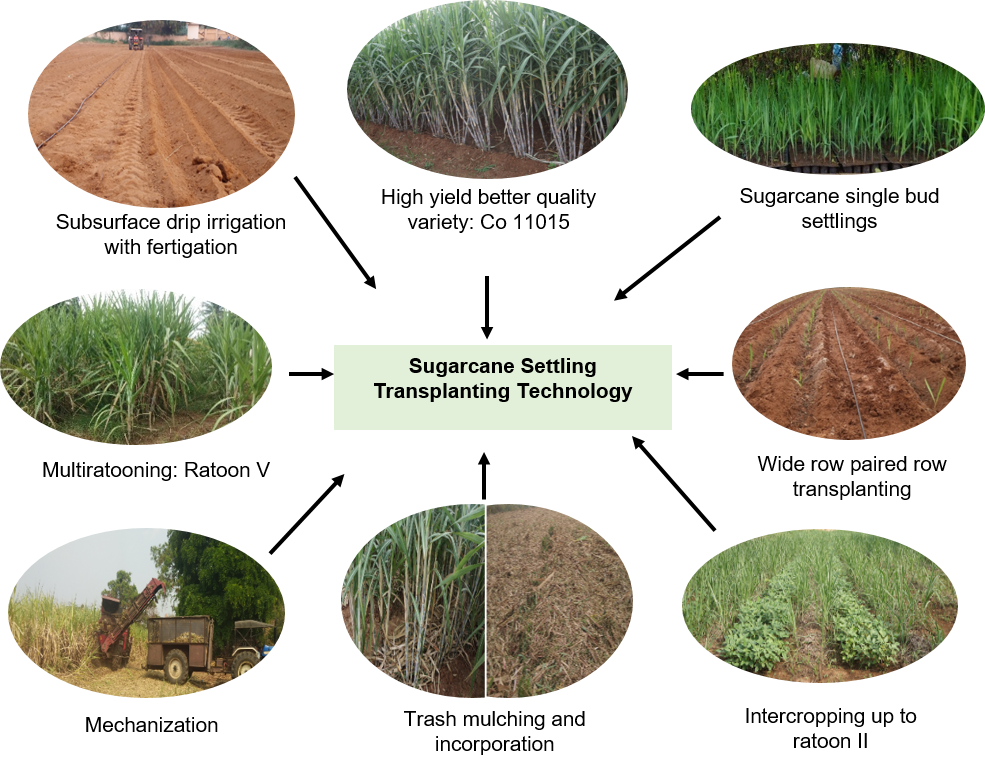Sugarcane Settling Transplanting Technology

Introduction
Indian agriculture is marching towards a science-based occupation rather than a subsistence livelihood. The modern approach to profitability and sustainability of agriculture is based on “more production with less input/investment”. The sugarcane is an important commercial crop cultivated in India, covering 5.89 million hectares with a production and productivity of 490.53 million tonnes and 83.35 tonnes per hectare, respectively in 2022-23 (DSD, 2024), and the demand is increasing not only for sugar but also for the by-products (energy, ethanol, etc.). India has emerged the largest producer as well as the consumer of sugar in the world in Sugar Season 2021-22 (PIB, 2023). Ethanol blending with petrol programme of the government resulted in strengthening energy security of the country and also reduction in dependence on imported fossil fuel thereby help to achieve Atmanirbhar Bharat in petroleum sector. Growing demand for sugar and other by-products of sugarcane necessitates enhancing sugarcane productivity. Although, theoretical maximum sugarcane yield reported is 472 t/ha (Moore, 2009), the five year (2018-19 to 2021-22) average sugarcane productivity in India is 82.21 t/ha (DSD, 2024) showing a wide-gap between the two. The possible reasons for the low productivity are cultivation of old and degenerated varieties, use of inferior quality sugarcane seeds over years and poor field stand, high seed cane requirement resulting in slow rate of seed and varietal replacement, improper plant and ratoon management, dwindling water resources and rainfall variability, imbalanced nutrient use, deteriorated soil health and non-availability of labourer for timely cultural operations.
Hence, sugarcane farmers need technological options to enhance the cane productivity with reduction in cost of cultivation. Keeping in mind the situations likely to be faced in future, for sugarcane agriculture, a production technology integrating nine important components, called Sugarcane Settling Transplanting Technology (STT) with high profitability, increased resource use efficiency and sustainable soil health has been developed by ICAR-Sugarcane Breeding Institute, Coimbatore. The objective of this technology is profit maximization in sugarcane with ecological sustainability by increasing productivity, reducing cost of cultivation, and providing interim additional income to the farmers through orderly combination of different scientific principles of crop cultivation. The strategies include reduction in preparatory tillage and seed costs (multiple ratooning, settling transplanting), reduction in input costs (settling transplanting, drip irrigation/fertigation, trash mulching), increase in water and nutrient use efficiencies (drip irrigation with fertigation, trash mulching), reduction in labour requirement (wider row planting, mechanization of cultural operations from field preparation to harvesting) and generation of intermittent /additional income (intercropping).
Technology Description
This technology was certified by NRM Division of ICAR (vide Certificate No. ICAR-NRM-SBI-Technology-2024-204).
Settling Transplanting Technology (STT), an integrated approach with nine basic components of sugarcane production aimed as a whole to improve productivity and reduce cultivation cost. Soil test-crop response based nutrient recommendation, Transplanting settlings (25-30 days old) derived from single bud setts of high yielding better quality variety treated with nutrients and pesticide using Sett Treatment Device, in paired row wider spacing (1.2 x 0.6/0.6 m), Intercropping (black gram, green gram, coriander, etc.), Sub-surface drip irrigation scheduling based on crop demand and pan evaporation and fertigation, Trash mulching at detrashing, and trash incorporation after harvest of plant and each ratoon crop, Multiple ratooning (up to 5 ratoons) and Mechanization of field operations from filed preparation to harvesting are the components of STT.
Benefits
STT technology results in profit maximization in sugarcane with ecological sustainability by 10-20% increase in productivity, 41.89% reduction in the cost of cultivation and generating interim additional income through intercropping. STT as a package resulted in 80% saving in seed cane requirement and 30% saving in planting cost over sett planting, saving of 52% water and 50% power consumption over conventional cultivation. STT generated benefit cost ratio of 1.93 at the end of five years. This technology also showed soil health sustainability with increase in soil organic carbon from 0.53 to 0.70% at the end of five ratoon crops. Hence, STT enhances productivity with reduced cost of cultivation and ensures ecological sustainability.
Technology dissemination
STT technology was demonstrated to about 800 farmers and 400 sugar factory personnel and state department officials through various training programmes and workshops. In addition, STT technology is being demonstrated under the NADP-Rashtriya Krishi Vikas Yojana – RAFTAAR, Government of Tamil Nadu Project on “Mechanized priming of planting material and technology popularization for revival of sugarcane productivity in Tamil Nadu” during 2022-2025.
Target users/stakeholders
Sugarcane farmers, Sugar factory personnel, Extension officials and Researchers
Contact for details
THE DIRECTOR,
ICAR-Sugarcane Breeding Institute,
Coimbatore 641007,
Tamil Nadu,India.
Phone: 0422 2472621
Email: director.sbi@icar.gov.in
Developers
- Vennila, S. Anusha, C. Palaniswami, Bakshi Ram, P. Malathi and V. Kasthuri Thilagam
Contact Address
-
ICAR-Sugarcane Breeding Institute
Veerakeralam,
Coimbatore 641007
Tamil Nadu. - Phone: 0422 - 2472621
- Email: director.sbi@icar.gov.in
- GST Number 33AAAAD2962K2ZT
Our Visitor Count







